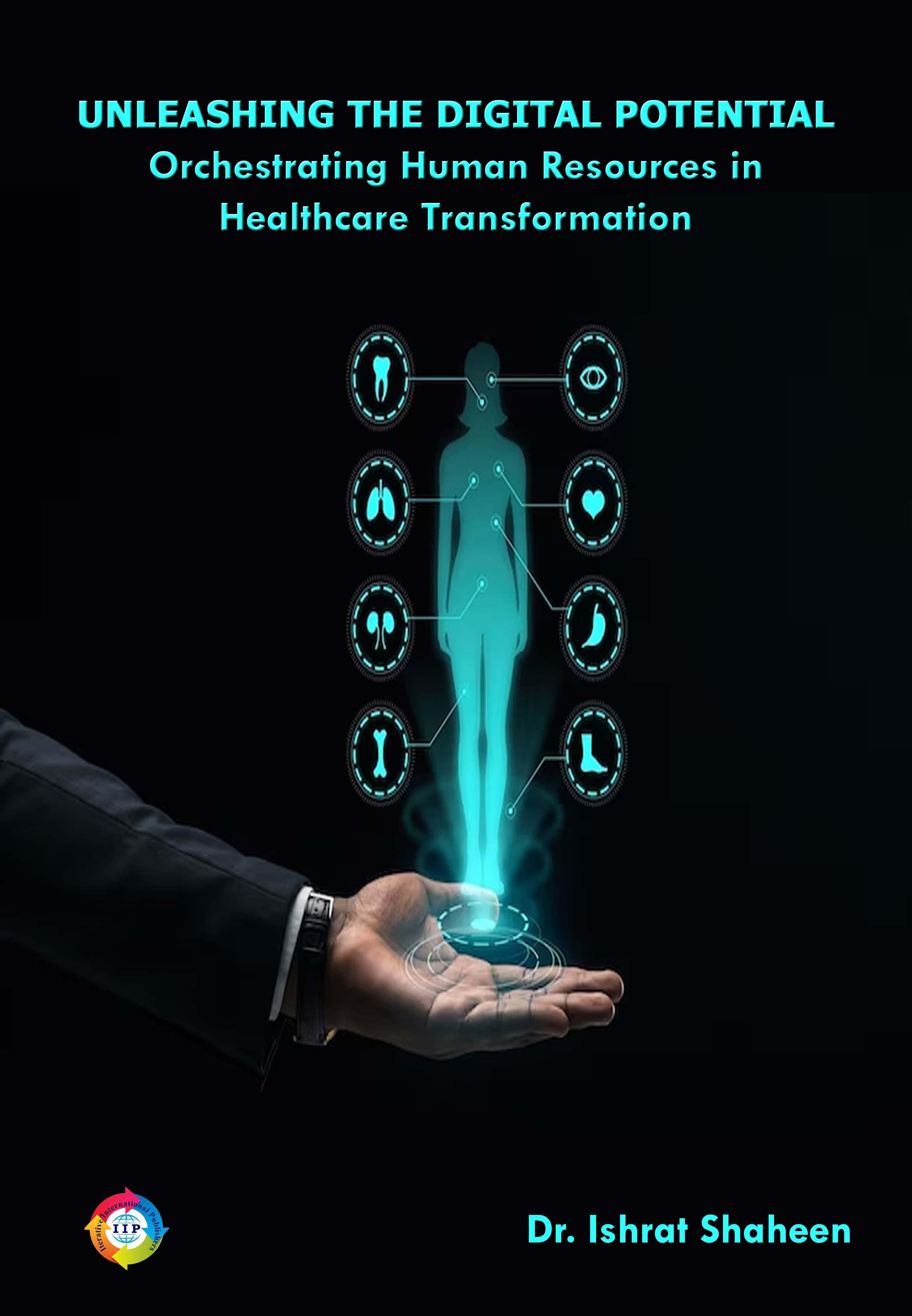
UNLEASHING THE DIGITAL POTENTIAL ORCHESTRATING HUMAN RESOURCES IN HEALTHCARE TRANSFORMATION
-
TypePrint
- CategoryAcademic
- Sub CategoryText Book
- StreamManagement
"Unleashing the Digital Potential: Orchestrating Human Resources in Healthcare Transformation" is a comprehensive exploration of the intersection between digital transformation and human resources management in the healthcare industry. This book delves into the crucial role that human resources play in driving successful digital initiatives and managing the transformational journey in healthcare organizations.
Chapter 1: Introduction
The first chapter sets the stage by providing an overview of digital transformation in healthcare. It highlights the significance of human resources management in the context of healthcare and emphasizes the relationship between digital transformation and human resources management. Understanding these foundational concepts is essential for healthcare leaders and HR professionals looking to navigate the digital landscape effectively.
Chapter 2: Digital Transformation in Healthcare
Chapter 2 delves deeper into the intricacies of digital transformation in healthcare. It defines key concepts and explores the profound impact of digital transformation on healthcare organizations. The chapter also examines the technological advancements that have revolutionized the industry, presenting compelling case studies that showcase successful digital transformation initiatives.
Chapter 3: Role of Human Resources in Digital Transformation
This chapter elucidates the critical role of human resources in driving and supporting digital transformation efforts within healthcare organizations. It explores the specific skills and competencies required for managing digital transformation, strategies for recruiting and retaining digital talent, and the importance of implementing effective training and development programs for healthcare professionals.
Chapter 4: Digital Tools and Technologies in Human Resources Management
Chapter 4 delves into the realm of digital tools and technologies used in human resources management. It provides an overview of the various digital tools and platforms available and explores their implementation in recruitment and selection processes, performance management systems, and employee engagement and communication initiatives.
Chapter 5: Data Analytics and Decision-Making in HRM
In this chapter, the role of data analytics in human resources management is examined in detail. It explores how data analytics can be leveraged for workforce planning and optimization, talent acquisition and retention, and highlights the ethical considerations surrounding its use in HRM.
Chapter 6: Employee Experience and Well-being in the Digital Age
The importance of employee experience and well-being in healthcare organizations is the focal point of this chapter. It explores the impact of digital transformation on employee experience and presents strategies for fostering well-being in a digital environment, including work-life balance and remote work policies.
Chapter 7: Change Management and Leadership in Digital Transformation
Chapter 7 addresses the crucial role of leadership in driving and managing digital transformation. It explores change management strategies, the importance of building a culture of innovation and continuous learning, and offers insights into overcoming resistance to change during the transformation journey.
Chapter 8: Ethical and Legal Considerations in Digital HRM
This chapter delves into the ethical and legal considerations surrounding the use of digital technologies in HRM. It explores privacy and data protection issues, compliance with healthcare regulations and standards, and the importance of ensuring fairness and equity in digital HRM practices.
Chapter 9: Future Trends and Challenges
Chapter 9 explores emerging trends in digital transformation and HRM in healthcare. It examines the implications of artificial intelligence and automation on HRM, the challenges and opportunities presented by rapid technological advancements, and provides strategies for staying agile and future-proofing HRM practices.
Chapter 10: Digital Skills Development for Healthcare Professionals
The importance of digital skills in the healthcare industry is the central focus of this chapter. It assesses the current digital skills gap, presents strategies for upskilling and reskilling healthcare professionals, and highlights the significance of collaboration between academia and healthcare organizations for digital skills development.
Chapter 11: Leveraging Digital Transformation for Recruitment and Retention
Chapter 11 explores how healthcare organizations can leverage digital strategies for attracting and recruiting top talent. It emphasizes enhancing the candidate experience through digital tools and platforms, retention strategies in the digital era, and the importance of employee branding and employer value proposition in a digital environment.
Chapter 12: Enhancing Patient Care through Digital HRM
This chapter examines the integration of HRM practices with patient care initiatives, leveraging technology to improve patient satisfaction and experience. It explores the collaboration between HR and clinical teams for better patient outcomes and highlights the measurement of the impact of digital HRM on patient care quality metrics.
Chapter 13: Managing Virtual and Remote Teams in Healthcare
Chapter 13 addresses the challenges and benefits of virtual and remote teams in healthcare. It presents strategies for effective communication and collaboration in virtual teams, building trust and fostering team cohesion in a digital environment, and ensuring productivity and performance management in remote healthcare settings.
Chapter 14: Cybersecurity and Data Protection in Digital HRM
The intricacies of cybersecurity and data protection in the healthcare sector are examined in this chapter. It highlights best practices for protecting sensitive HR and employee data, compliance with data protection regulations, and incident response and recovery strategies for HR-related data breaches.
Chapter 15: Measuring the ROI of Digital HRM in Healthcare
Chapter 15 explores metrics and key performance indicators for assessing the impact of digital HRM. It delves into measuring the return on investment of digital transformation initiatives, showcasing case studies and examples of successful ROI measurement in healthcare HRM, and emphasizes continuous improvement and optimization based on data analysis.
Chapter 16: Building a Culture of Digital Innovation in Healthcare
Chapter 16 focuses on fostering a culture of innovation in healthcare organizations. It explores strategies for encouraging creativity and idea generation among employees, implementing innovation labs and incubators, and highlights the leadership's role in supporting and promoting a culture of digital innovation.
Chapter 17: Addressing Ethical and Social Implications of Digital Transformation
This chapter addresses the ethical and social implications of digital transformation, specifically focusing on the use of AI and machine learning in healthcare HRM. It emphasizes transparency and fairness in algorithmic decision-making, explores the social impact of automation on healthcare employment, and presents ethical frameworks and guidelines.
Chapter 18: Collaboration and Partnerships in Digital HRM
Chapter 18 delves into collaborative approaches between healthcare organizations and technology providers. It highlights the significance of strategic partnerships for digital HRM innovation and implementation, the sharing of best practices and lessons learned through industry collaborations, and the importance of cross-sector partnerships to address workforce challenges.
Chapter 19: Roadmap for Successful Digital Transformation and HRM Integration
This chapter provides a step-by-step guide for healthcare organizations embarking on digital transformation. It emphasizes the integration of HRM practices into the digital transformation roadmap, key considerations for change management and stakeholder engagement, and strategies for sustaining and evolving digital transformation initiatives in the long term.
Chapter 20: Conclusion
In this final chapter, we reflect on the wealth of knowledge and insights presented throughout the book, "Unleashing the Digital Potential: Orchestrating Human Resources in Healthcare Transformation." The convergence of digital transformation and human resources management has emerged as a critical imperative for healthcare organizations seeking to thrive in an era of rapid technological advancements. As we conclude this journey, we summarize the key points discussed and offer recommendations for healthcare organizations and HR professionals to navigate the future of digital transformation and HRM in healthcare.
Throughout the book, we have explored the dynamic landscape of digital transformation in healthcare and recognized the importance of human resources management in driving and supporting these initiatives. The integration of digital tools, technologies, and analytics in HRM practices has the potential to revolutionize the way healthcare organizations attract, develop, and retain talent, while enhancing the overall employee experience and well-being. We have witnessed the profound impact of digital transformation on healthcare organizations, empowering them to optimize processes, improve patient care, and achieve better outcomes. Case studies and examples have demonstrated successful digital transformation initiatives, highlighting the power of innovative technologies and strategic approaches to HRM. As we move forward, it is crucial for healthcare organizations to recognize the significance of digital skills development for healthcare professionals. Bridging the digital skills gap and fostering a culture of continuous learning will be pivotal in embracing the transformative potential of digital technologies. Recruitment and retention strategies must be adapted to the digital era, leveraging digital tools and platforms to attract top talent, enhance the candidate experience, and build a strong employer brand. Moreover, the integration of HRM practices with patient care initiatives and collaboration between HR and clinical teams will be essential in achieving improved patient satisfaction and outcomes.
Addressing ethical considerations and ensuring data protection in the digital age is of utmost importance. Healthcare organizations must prioritize privacy, compliance with regulations, and fairness in the use of digital technologies in HRM. Additionally, the ethical and social implications of automation and AI require thoughtful consideration to mitigate any unintended consequences. Building a culture of digital innovation is a key pillar for healthcare organizations seeking to remain agile and adaptive in the face of constant technological advancements. Encouraging creativity, implementing innovation labs, and nurturing leadership support are vital in fostering a culture that embraces digital transformation. Collaboration and partnerships between healthcare organizations and technology providers are paramount. Strategic alliances can accelerate innovation, foster knowledge sharing, and address workforce challenges collectively. Cross-sector collaborations offer opportunities to leverage expertise and resources for the benefit of all stakeholders. To embark on a successful digital transformation journey, healthcare organizations need a well-defined roadmap. Integration of HRM practices into the overall digital transformation strategy, change management, stakeholder engagement, and continuous improvement based on data analysis are critical elements of this roadmap.
In conclusion, "Unleashing the Digital Potential: Orchestrating Human Resources in Healthcare Transformation" serves as a comprehensive guide for healthcare leaders, HR professionals, and industry stakeholders seeking to harness the power of digital transformation while effectively managing human resources. By embracing digital technologies, fostering a culture of innovation, and prioritizing the well-being of employees, healthcare organizations can navigate the complex landscape of digital transformation and deliver enhanced patient care and outcomes. As the healthcare industry continues to evolve, it is our hope that this book will inspire and empower individuals and organizations to embrace the digital revolution, drive transformative change, and shape a future where technology and human resources work in harmony to create a healthcare ecosystem that is efficient, compassionate, and sustainable.
**Note: IIP Store is the best place to buy books published by Iterative International Publishers. Price at IIP Store is always less than Amazon, Amazon Kindle, and Flipkart.





COMMENTS
No Review found for book with Book title. UNLEASHING THE DIGITAL POTENTIAL ORCHESTRATING HUMAN RESOURCES IN HEALTHCARE TRANSFORMATION